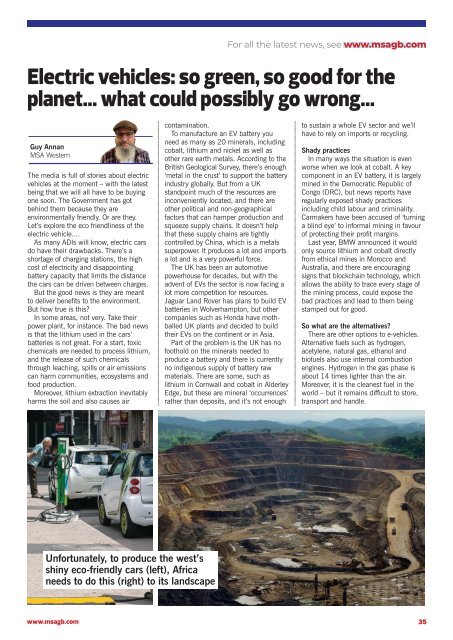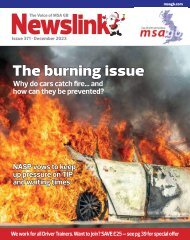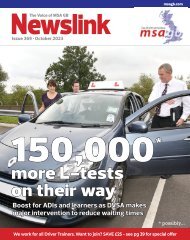Newslink February 2021
Motor Schools Association of Great Britain membership magazine; driver training and testing; road safety.
Motor Schools Association of Great Britain membership magazine; driver training and testing; road safety.
You also want an ePaper? Increase the reach of your titles
YUMPU automatically turns print PDFs into web optimized ePapers that Google loves.
For all the latest news, see www.msagb.com<br />
Electric vehicles: so green, so good for the<br />
planet... what could possibly go wrong...<br />
Guy Annan<br />
MSA Western<br />
The media is full of stories about electric<br />
vehicles at the moment – with the latest<br />
being that we will all have to be buying<br />
one soon. The Government has got<br />
behind them because they are<br />
environmentally friendly. Or are they.<br />
Let’s explore the eco friendliness of the<br />
electric vehicle....<br />
As many ADIs will know, electric cars<br />
do have their drawbacks. There’s a<br />
shortage of charging stations, the high<br />
cost of electricity and disappointing<br />
battery capacity that limits the distance<br />
the cars can be driven between charges.<br />
But the good news is they are meant<br />
to deliver benefits to the environment.<br />
But how true is this?<br />
In some areas, not very. Take their<br />
power plant, for instance. The bad news<br />
is that the lithium used in the cars’<br />
batteries is not great. For a start, toxic<br />
chemicals are needed to process lithium,<br />
and the release of such chemicals<br />
through leaching, spills or air emissions<br />
can harm communities, ecosystems and<br />
food production.<br />
Moreover, lithium extraction inevitably<br />
harms the soil and also causes air<br />
contamination.<br />
To manufacture an EV battery you<br />
need as many as 20 minerals, including<br />
cobalt, lithium and nickel as well as<br />
other rare earth metals. According to the<br />
British Geological Survey, there’s enough<br />
‘metal in the crust’ to support the battery<br />
industry globally. But from a UK<br />
standpoint much of the resources are<br />
inconveniently located, and there are<br />
other political and non-geographical<br />
factors that can hamper production and<br />
squeeze supply chains. It doesn’t help<br />
that these supply chains are tightly<br />
controlled by China, which is a metals<br />
superpower. It produces a lot and imports<br />
a lot and is a very powerful force.<br />
The UK has been an automotive<br />
powerhouse for decades, but with the<br />
advent of EVs the sector is now facing a<br />
lot more competition for resources.<br />
Jaguar Land Rover has plans to build EV<br />
batteries in Wolverhampton, but other<br />
companies such as Honda have mothballed<br />
UK plants and decided to build<br />
their EVs on the continent or in Asia.<br />
Part of the problem is the UK has no<br />
foothold on the minerals needed to<br />
produce a battery and there is currently<br />
no indigenous supply of battery raw<br />
materials. There are some, such as<br />
lithium in Cornwall and cobalt in Alderley<br />
Edge, but these are mineral ‘occurrences’<br />
rather than deposits, and it’s not enough<br />
to sustain a whole EV sector and we’ll<br />
have to rely on imports or recycling.<br />
Shady practices<br />
In many ways the situation is even<br />
worse when we look at cobalt. A key<br />
component in an EV battery, it is largely<br />
mined in the Democratic Republic of<br />
Congo (DRC), but news reports have<br />
regularly exposed shady practices<br />
including child labour and criminality.<br />
Carmakers have been accused of ‘turning<br />
a blind eye’ to informal mining in favour<br />
of protecting their profit margins.<br />
Last year, BMW announced it would<br />
only source lithium and cobalt directly<br />
from ethical mines in Morocco and<br />
Australia, and there are encouraging<br />
signs that blockchain technology, which<br />
allows the ability to trace every stage of<br />
the mining process, could expose the<br />
bad practices and lead to them being<br />
stamped out for good.<br />
So what are the alternatives?<br />
There are other options to e-vehicles.<br />
Alternative fuels such as hydrogen,<br />
acetylene, natural gas, ethanol and<br />
biofuels also use internal combustion<br />
engines. Hydrogen in the gas phase is<br />
about 14 times lighter than the air.<br />
Moreover, it is the cleanest fuel in the<br />
world – but it remains difficult to store,<br />
transport and handle.<br />
Unfortunately, to produce the west’s<br />
shiny eco-friendly cars (left), Africa<br />
needs to do this (right) to its landscape<br />
www.msagb.com<br />
35

















